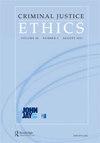False Reporting in the Norwegian Police: Analyzing Counter-productive Elements in Performance Management Systems
Q2 Social Sciences
引用次数: 0
Abstract
Despite the growing body of work exploring the weaknesses of police performance systems and the displacement of their goals, less attention has been given to why police officers resist and circumvent by false reporting. Whether police report honestly on their activities is a matter of considerable significance given the role that police have in a broadly democratic society, and the overall question is whether the false reporting undermines the integrity of the police or if it is a collective coping strategy that safeguards the police ethos? This survey reveals that 25% of respondents (n = 2248) had manipulated the numbers at least once in the previous year. To identify why they did so, the variables selected for analysis are those determining their view of the Management by Objective (MBO) system, how far they have participated in the MBO process and how often they are unable to assist a member of the public. Our results show that men are more likely to manipulate the numbers than women and non-leaders are more likely to do so than leaders. Respondents were more likely to submit false reports if they had not participated in the MBO process, were not motivated by MBO goals, believed the MBO indicators misdirected their focus and frequently felt that they were forced to reject members of the public they would like to help. Our findings further show that public servants can be corrupted, though they do not “bring” vices to work with them, but rather acquire vices through what is required of them.挪威警方的虚假报告:绩效管理体系中的反生产因素分析
尽管越来越多的工作在探索警察绩效系统的弱点及其目标的偏离,但人们对警察为什么抵制和规避虚假报告的关注却很少。考虑到警察在一个广泛民主的社会中所扮演的角色,警察是否诚实地报告他们的活动是一个相当重要的问题,总体问题是,虚假报告是否破坏了警察的诚信,还是这是一种维护警察精神的集体应对策略?这项调查显示,25%的受访者( = 2248)在前一年至少操纵过一次数字。为了确定他们这样做的原因,选择进行分析的变量是确定他们对目标管理(MBO)系统的看法、他们参与MBO过程的程度以及他们无法帮助公众的频率。我们的研究结果表明,男性比女性更有可能操纵数字,而非领导者比领导者更有可能这样做。如果受访者没有参与MBO过程,没有MBO目标的动机,认为MBO指标误导了他们的关注点,并且经常觉得他们被迫拒绝他们想要帮助的公众,那么他们更有可能提交虚假报告。我们的研究结果进一步表明,公务员可能会腐败,尽管他们不会“带”恶习与他们一起工作,而是通过对他们的要求来获得恶习。
本文章由计算机程序翻译,如有差异,请以英文原文为准。
求助全文
约1分钟内获得全文
求助全文

 求助内容:
求助内容: 应助结果提醒方式:
应助结果提醒方式:


